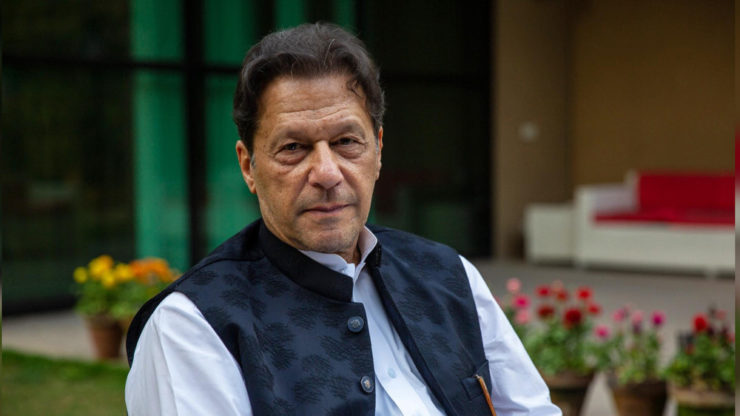
A cricketer-turned-politician, philanthropist, former Prime Minister and the Chairman of Pakistan’s largest political party continues his fight against tyranny and oppression from behind bars.
Imran Khan, who turned 71-years old this month, was transferred from Attock to Adiala Jail a few weeks ago. Recent reports have brought to light the harrowing conditions in which Khan is being held. During the last in-camera hearing of the Cipher case, the former Prime Minister engaged in a heated discussion with the presiding judge, Mr. Abual Hasnat Muhammad Zulqarnain, regarding the conditions of his confinement in Adiala Jail. It is a matter of public knowledge that Imran Khan is being subjected to what can only be described as psychological torture. His cell measures a mere 4 feet in width, 7 feet in length, and 6 feet in height. This cell is notably two inches shorter than Khan’s own height, which stands at 6 feet 2 inches. This cramped and confining space renders him virtually immobile, and according to his medical advisors, Khan is required to walk in order to complete the restoration of sensation in his leg, which was severely injured during a failed assassination attempt on November 3, 2022.
Remarkably, the failed assassination attempt has not been legally linked to anyone, despite almost a year having passed since the incident took place. It is widely believed in Pakistan that this attempt on Imran Khan’s life, if successful, would have been attributed to religious extremists. This underscores the gravity of the situation and the security concerns surrounding Khan, especially now that he is away from the public eye.
Going back to the trial, Judge Zulqarnain decided to visit Khan’s cell on his request and acknowledged the inhumane conditions in which Khan is being held. Subsequently, the judge issued an order directing the superintendent of Adiala Jail to provide Imran Khan with the much-needed space for walking.
Sources close to Khan state that the provision of a corridor for him to walk in has visibly improved his state. Imran Khan reportedly engages himself in reading and introspection during his time in prison, proving his indomitable spirit and determination even in the face of adversity. Khan has steadfastly refused to bow down to the power center of Pakistan and continues to maintain his principles despite the challenges he faces. Notably, many researchers have drawn parallels between Khan’s ordeal and the experiences of other world leaders who served prison time, such as Vladimir Lenin, Pandit Nehru, Saddam Hussein, and Nelson Mandela. It is a historical fact that imprisonment often served to refine and strengthen the minds and thoughts of these leaders, and it remains to be seen how Imran Khan’s own perspective will evolve upon his release.
Khan’s resilience is manifest in his modest requests during his confinement. Unlike Nawaz Sharif and others, Imran Khan did not seek air-conditioned cells or extravagant meals. Instead, he requested books and the basic freedom to walk. Imran Khan is undergoing a crucial phase of personal growth.
While talking about Imran Khan, it is also crucial to examine the broader political landscape in Pakistan. The country’s establishment is using all possible means to tarnish Imran Khan and his political party. In an interesting development, reports from within Pakistan have stated that anti-Imran Khan movies are being screened in many army and private schools, as well as military academies across the country. The Inter-Services Public Relations (ISPR), the media wing of the Pakistan Armed Forces, has been criticized for years for attempting to generate nationalist sentiments through songs, movies, and dramas. In an economically challenged country, ISPR’s substantial investment in creating movies for pro-military propaganda seems amusing at best. It appears that these efforts to manipulate public opinion may be faltering.
The future of Imran Khan’s incarceration and the outcome of the Cipher case remain uncertain. What is certain, however, is that Khan’s arrest and imprisonment have not followed any conventional legal processes, and neither will his release have anything to do with any legal process or law. Sources indicate that he may have to endure an extended period of custody, as he adamantly refuses to quit politics and relinquish the fate of his country to the looters and goons.
Imran Khan’s ouster and the events of May 9, followed by Khan’s incarceration and the return of former Prime Minister and fugitive Nawaz Sharif, have all served to expose the deeply concerning moral, legal, and democratic situation of a country that was created in the name of a peaceful religion. The sequence of events in the last 19 months has laid bare the broader issues of political power, security, and justice in the country. Despite having been exposed, the establishment shows no inclination to relinquish the power it has held dearly for decades. On the other side, Imran Khan and his supporters are unwavering in their determination, refusing to yield in their quest for a more just and equitable political landscape. Pakistan finds itself at a pivotal crossroads in its history, facing a decisive moment that will determine whether it can successfully evolve into a thriving democratic nation or risk falling short of its potential as a nation-state.
Taut Bataut – is a researcher and writer that publishes on South Asian geopolitics, exclusively for the online magazine “New Eastern Outlook”.